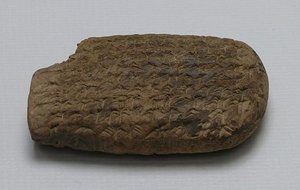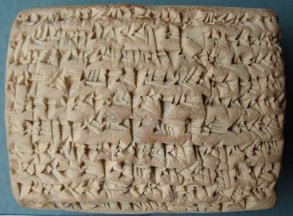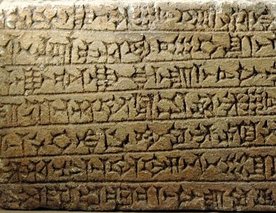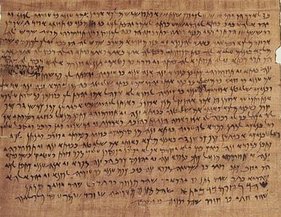Project Structure
Objectives: These two sub-projects focus on the extensive Babylonian material, written in the Babylonian dialect of the Akkadian language, written in Babylonian cuneiform script. Sub-project 2 focuses on direct taxation of the households of free Babylonians. We will also investigate indirect taxes, such as bridge and gate tolls and harbor and custom fees. A key objective is to chart all available quantitative data with the eventual purpose of giving approximations of the tax burden of elite private households. The second key objective is qualitative in nature. We will look at administrative structures in a diachronic perspective and analyze who was in charge of the networks of control and revenue collection in Babylonia at the time of the Neo-Babylonian and Persian Empires.
The third sub-project focusses on the institutional realm, such as temples and state and crown lands. We will work out developmental phases in the administration of Babylonia and elucidate on fiscal and administrative reforms, both before and after the North-Babylonian insurrection against Persian rule in 484 BC.
Sub-project 2: Tolls and Taxes – The Evidence from Babylonian Private Archives
Sub-project 3: Taxation on State Land and Institutional Households
Researchers: Kristin Kleber, Principal Investigator; Pieter Alkemade (from September 2015 on); Bastian Still (September 2016-September 2017); Benjamin Dromard (from September 2017 on)
Cuneiform tablet from Persepolis
Sub-project 1: Taxation and Corvée Labor in the Iranian Heartland
Researcher: Mark Tamerus, PhD candidate
Objectives: This PhD project investigates the mobilization and consumption of resources as reflected in the Persepolis Fortification Archive (PFA). Texts from this archive are primarily written in Elamite language. The archive yields abundant information on estates, including royal domains, dependent workers (kurtaš) as well as the contributions for the ‘table of the king', also known from classical and biblical sources and from primary sources from Babylonia and Bactria. The large number of texts on dependent laborers will enable statistical analyses of their remuneration and of their ethnic composition, as distinct ethnic groups formed administrative units.
© Cindy Meijer
Sub-project 4: Gimillu, the Rascal – The Extraordinary Life and Career of a Babylonian Temple Dependent in the 6th century BC
Researchers: Kristin Kleber, Principal Investigator
Objectives: This sub-project aims to create a micro-historical narrative of the career of the temple dependent Gimillu, son of Innin-šumu-ibni, in a book designed for scholars and an interested general public alike. Gimillu’s dubious fame within Assyriology is predicated on the many thefts and embezzlements that he committed over years while he was responsible for the temple’s animal husbandry. Most surprisingly, he subsequently continued business instead of being banned from influential offices. We now have almost 100 texts pertaining to this extraordinary individual. The book aims to be entertaining but at the same time tries to carve out societal phenomena and tensions of the time.
Workshop
In 2018 we will organize a workshop to intensively discuss the information that Aramaic sources from the Achaemenid Empire can contribute on taxation and administration. It will also be a forum to present our own results. We will invite specialists working on the pertinent Aramaic material as well as scholars who can contribute on aspects of taxation from the Hellenistic period to carve out possible continuities.
Elamite inscription on a brick Aramaic papyrus Neo-Babylonian clay tablet
Staff
Project Members
Kristin Kleber
Principal Investigator
Associate Professor of Ancient Near Eastern Studies, Vrije Universiteit Amsterdam (VU).
Contact: k.kleber@vu.nl
Mark Tamerus
PhD candidate, Vrije Universiteit Amsterdam (VU).
Contact: m.tamerus@vu.nl
Pieter Alkemade
PhD candidate, Vrije Universiteit Amsterdam (VU).
Contact: p.alkemade@vu.nl
Benjamin Dromard
Post-doctoral scholar, Vrije Universiteit Amsterdam (VU)
Contact: benjamin.dromard@gmail.com;
Advisors
Wouter F.M. Henkelman
Maître de Conférence, Mondes élamites et achéménides at the École Pratique des Hautes Études, Sciences Historiques et Philologiques, Paris.
Research Associate at the Oriental Institute Chicago.
Expertise: Elamite language, Editor of Elamite tablets of the Persepolis Fortification Archive
Margaretha L. Folmer
Lecturer in Semitics at Vrije Universiteit Amsterdam and Leiden University
Expertise: Aramaic and Hebrew language
Robartus J. van der Spek
Professor em. of Ancient Mediterranean and West Asian History, VU University Amsterdam
Expertise: Hellenistic Babylonia and Greek historiography
Interns
Cindy Meijer
Graduate Student (Research Master trajectory), Vrije Universiteit Amsterdam
Project Internship June-July 2015, temporary Web-master
Linda Rossini
Undergraduate Student (BA), Vrije Universiteit Amsterdam
Project Internship 2014/2015
© 2015-20 Achaemenid Taxation Project










